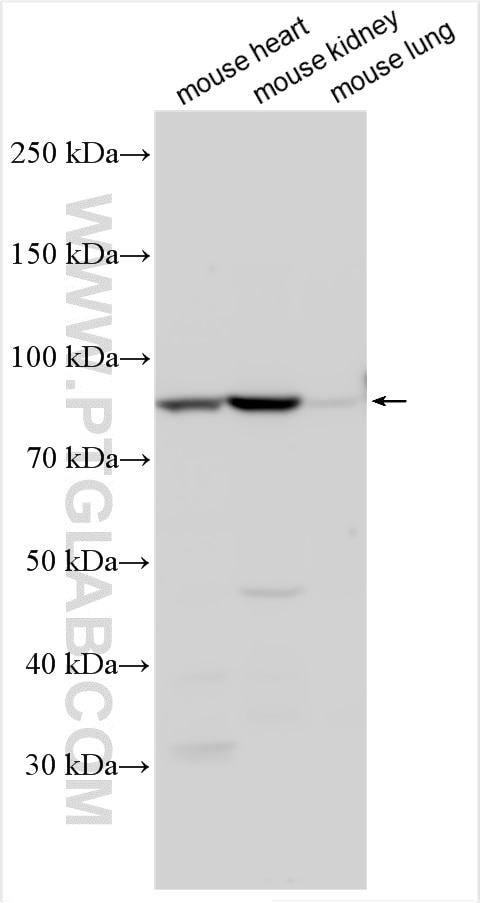Tested Applications
| Positive WB detected in | mouse heart tissue, mouse kidney tissue, mouse lung tissue |
Recommended dilution
| Application | Dilution |
|---|---|
| Western Blot (WB) | WB : 1:500-1:2000 |
| It is recommended that this reagent should be titrated in each testing system to obtain optimal results. | |
| Sample-dependent, Check data in validation data gallery. | |
Published Applications
| IHC | See 1 publications below |
Product Information
11828-1-AP targets EMCN in WB, IHC, ELISA applications and shows reactivity with human, mouse samples.
| Tested Reactivity | human, mouse |
| Cited Reactivity | rat |
| Host / Isotype | Rabbit / IgG |
| Class | Polyclonal |
| Type | Antibody |
| Immunogen | EMCN fusion protein Ag2396 Predict reactive species |
| Full Name | endomucin |
| Calculated Molecular Weight | 19 kDa, 27 kDa |
| Observed Molecular Weight | 85 kDa |
| GenBank Accession Number | BC017781 |
| Gene Symbol | EMCN |
| Gene ID (NCBI) | 51705 |
| RRID | AB_3085382 |
| Conjugate | Unconjugated |
| Form | Liquid |
| Purification Method | Antigen affinity purification |
| UNIPROT ID | Q9ULC0 |
| Storage Buffer | PBS with 0.02% sodium azide and 50% glycerol pH 7.3. |
| Storage Conditions | Store at -20°C. Stable for one year after shipment. Aliquoting is unnecessary for -20oC storage. 20ul sizes contain 0.1% BSA. |
Background Information
Endomucin (EMCN), also known as Endomucin 2 or Mucin 14, is a type I integral membrane glycoprotein that is endothelial-specific. EMCN is expressed on the surface of capillaries and venous and is highly expressed in highly vascularized tissues such as heart, kidney and lung (PMID: 29215001). Endomucin plays an important role in cell interaction, molecular cell signaling, angiogenesis and cell migration (PMID: 33532708). Since it is glycosylated, the apparent molecular weight of EMCN could be variable, ranging from 80 kDa to 120 kDa.
Protocols
| Product Specific Protocols | |
|---|---|
| WB protocol for EMCN antibody 11828-1-AP | Download protocol |
| Standard Protocols | |
|---|---|
| Click here to view our Standard Protocols |
Publications
| Species | Application | Title |
|---|---|---|
BMC Musculoskelet Disord Transcutaneous CO2 application combined with low-intensity pulsed ultrasound accelerates bone fracture healing in rats |



